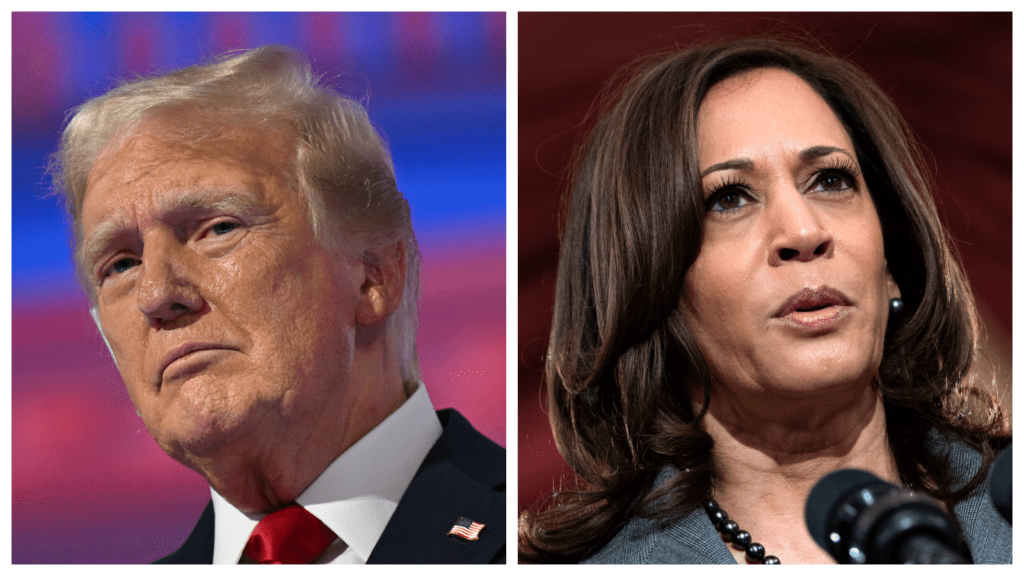Political bettors are increasingly favoring former President Donald Trump in the November election, as odds continue to shift in his direction. According to Polymarket, which monitors online betting on the election outcome, Trump now has 51% support among bettors, compared to 47% for Vice President Kamala Harris.
This 4% edge for Trump is slightly down from the 5% lead he held following a contentious Democratic National Convention last month. Despite this minor drop, Trump remains in a strong position. Before the DNC, Trump was trailing Harris 48% to 52%, reflecting an eight-point net shift in his favor over the past few weeks.
Trump’s lead grew to 4% overnight. pic.twitter.com/nZJZbaD3Uu
— Polymarket (@Polymarket) September 3, 2024
Political bettors have clear predictions for most swing states, except Pennsylvania and Nevada—states that Trump won in 2016 but lost in his 2020 reelection bid. Key battlegrounds like Georgia, North Carolina, Arizona, and Maine’s 2nd Congressional District are currently leaning Republican. Meanwhile, the “blue wall” of midwestern states such as Wisconsin and Michigan is anticipated to stay in Harris’s column, according to current betting trends.
Over the Labor Day weekend, Harris and President Joe Biden held a joint rally in Pennsylvania, where they strongly criticized Trump for enacting policies detrimental to workers during his tenure. Addressing concerns about the potential sale of U.S. Steel to a Japanese conglomerate, Harris publicly opposed the deal, asserting that the nation’s largest steel producer should stay under domestic ownership. Their rally wasn’t without its awkward moments; notably, President Biden recounted a meandering and somewhat unrelated tale about the 1906 election involving an accusation of murder against his great-grandfather.
Despite prevailing skepticism from bettors about his chances in Wisconsin and Michigan, the Trump campaign and its allies are intensifying their efforts in these states. Over the weekend, the Huffington Post reported that a pro-Trump political action committee launched digital ads aimed at Muslim voters in Michigan. These ads highlighted Vice President Harris’s criticism of pro-Palestinian protesters, leading to accusations of dirty politics from Democrats. Prior to President Biden’s decision to end his campaign, Rep. Debbie Dingell (D-MI) had cautioned her party about the risks of neglecting Michigan.
Dingell told CNN in September a year ago that Michigan is not a blue state. “It is purple. It is a very competitive state. And Donald Trump would do well in Michigan right now. The election’s a year away, we’re at a very volatile time, but I’m not taking Michigan for granted and I’m going to say I said that very strongly to many people,” she said.
Pollster Frank Luntz suggested last week that Robert F. Kennedy Jr.’s endorsement of Trump could be a decisive factor in swing states crucial to the election outcome. Speaking with NewsNation’s Leland Vittert, Luntz discussed Kennedy’s decision to back Trump after his own independent presidential campaign. Luntz pointed out that while Kennedy’s influence has waned since Harris became the Democratic frontrunner, his remaining supporters could still play a critical role in a close race where a few thousand votes in key states could determine the winner.
“It’s probably worth about 1% for Trump, and that 1% could be everything if it’s in the swing states. In the end, the reason why Kennedy was drawing 10, 12, even as high as 14% is because he was taking votes away from Joe Biden. Joe Biden’s gone. Kamala Harris has replaced him, and [RFK’s] vote collapsed down to about 4 or 5%, and what’s left is a Trump vote,” Luntz said. He noted that polling shows that the remaining Kennedy voters will likely switch to voting for Trump, if they participate in November at all.
“Some of them are simply not going to participate in November. Roughly two to one, the ones who are remaining will vote for Trump over Harris and that’s worth a single percent and that single percent can make the difference in Pennsylvania, Michigan, and Wisconsin,” he said. During the interview, Luntz also criticized the media, arguing that Kennedy’s potential impact is being downplayed based on the candidate he endorsed.



